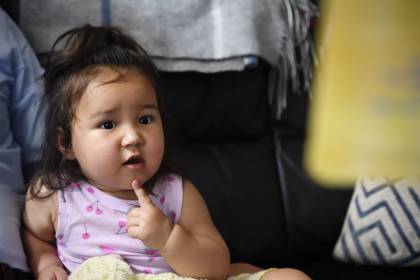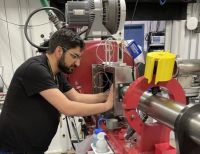- Name
- Jill Rosen
- [email protected]
- Office phone
- 443-997-9906
- Cell phone
- 443-547-8805
- JHUmediareps
A first-of-its-kind longitudinal study of infant curiosity found that months-old babies most captivated by magic tricks became the most curious toddlers, suggesting a pre-verbal baby's level of interest in surprising aspects of the world remains constant over time and could predict their future cognitive ability.
"Something about a baby's curiosity about magic tricks is predicting how curious they become as preschoolers," said Lisa Feigenson, co-director of the Johns Hopkins University Laboratory for Child Development. "What the data suggest is that some three-year-olds have a leg up or seem particularly well positioned to learn a lot about the world."
The findings appear today in Proceedings of the National Academy of Sciences.
Until this study, little was known about curiosity in the pre-verbal mind, as curiosity has mainly been studied in much older children and adults.
The key question behind this work was sparked by Feigenson's own curiosity, and that of lead author Johns Hopkins graduate student Jasmin Perez, about a constant frustration with the classic experimental method for studying infant cognition. In those experiments, babies are shown regular objects and objects behaving in surprising, unexpected ways. Many but not all babies tend to look longer at the unexpected events. Some will stare and stare at a car that seems to float in midair or a ball that seems to pass through a solid wall. Other babies will take a glimpse, yawn, and they're done.

Researchers assumed the variability was due to babies being babies—maybe they were fussy or hungry or distracted. But Feigenson and Perez suspected something important was happening.
"We started to wonder if maybe all of that individual variability is actually meaningful, and tells us that babies are responding to the world differently, from baby to baby," Perez said.
To find out, they launched an experiment where they studied 65 babies over time. At 11 months old, some babies were shown a toy that behaved normally, while others saw the toy seemingly pass straight through a wall. Six months later, the babies, now a year and a half old, now saw either a new toy that behaved normally, or seemed to float in mid-air.
"We found babies who looked really long at magical objects at 11 months were the same babies that looked really long at magical objects at 17 months," Perez said. "Babies are affected by these magical events in different ways, and these ways appear to be stable across a six-month period during infancy."
There was also little change in the least interested babies over the six-month period.
But was this difference among babies predictive of future thinking? To determine that, the team originally wanted to bring the participants back to the lab after they turned three, but because of the pandemic, they instead sent their parents standardized curiosity questionnaires.
They found that the babies who looked longest at events that defied their expectations were the ones whose parents rated them as most curious in an information-seeking, problem-solving way—the type of curiosity most likely to help children learn about the world.
Feigenson's lab previously found that these magical, expectation-defying events are learning opportunities for babies. The new findings, which show some kids are better at noticing these surprising events in the first place, raise the possibility that some kids are better positioned to learn, at least in this way that uses expectation violations as leverage to think more deeply about the world.
The team plans to follow-up with the cohort to see just how long lasting and broad the individual differences among the children become.
"One reason these results are exciting is they open the door to so many other important questions," Feigenson said. "What does it mean for the children in the future? Are these kids also rated as most curious in middle school? Are those kids going to score highest on school achievement tests or IQ tests? These results are screaming out for longitudinal follow-up."















